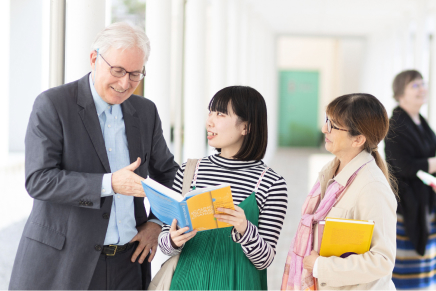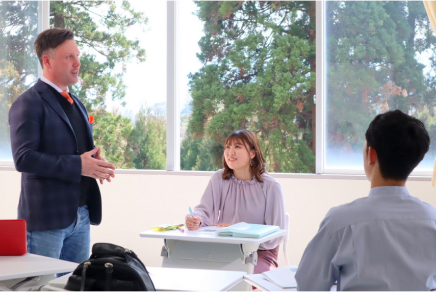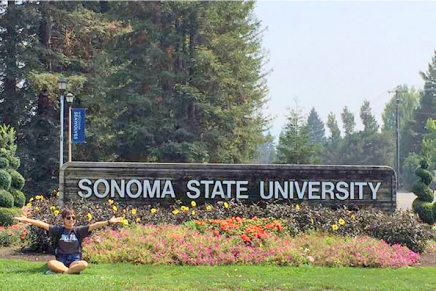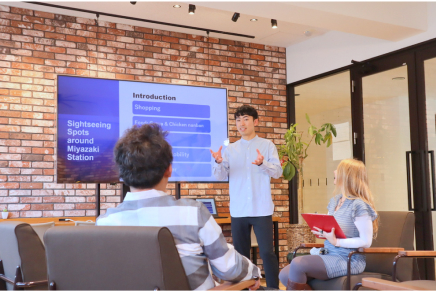Aspects of Education
GLOBAL EDUCATIONAL ENVIRONMENT
Approximately 70% international faculty
To learn and understand the diverse cultures and perspectives in our world, it is not only effective, but sometimes necessary, to learn directly from the people of those cultures or from people who have profound knowledge of them. Approximately 70% of the faculty of the School of International Liberal Arts are non-Japanese, requiring that English be the lingua franca of the campus. Through the time they spend every day on a campus overflowing with diverse cultures, ideas, and senses of values, students learn first-hand the meaning of multicultural coexistence, the new wave in globalization.

ACTIVE LEARNING
conducted in ENGLISH
Because we aim to develop globally competent adults with critical thinking skills and advanced language ability, we teach our courses in English. Classes are run on the basis of active learning methodology, and in the School of International Liberal Arts you will find no classes where all you do is listen to a lecture and take notes. Students are required to think on their own or in collaboration with classmates, and in the process of finding a solution to issues at hand, strengthen their abilities to communicate in English while they hone their critical thinking skills.

LIBERAL ARTS EDUCATION AND STUDY ABROAD
develops broad knowledge and multifaceted perspectives
The curriculum of the School of International Liberal Arts is comprised of liberal arts courses in the humanities, social sciences and general sciences, whose diverse approaches provide students the opportunity to develop a broad education and a multifaceted perspective that is unfettered by narrow boundaries. Additionally, students take part in programs of study abroad in one of five English-speaking countries. During their semester abroad, they not only hone their English skills, but also acquire a broader perspective on the world that would not have been possible in Japan. They also develop a sense of themselves as Japanese and the self-confidence and independence they will need to live in our global society.


Choose from 4 specialized courses that lead to your future
-
Global Liberal Arts Course
Aiming to become human resources who can contribute to the achievement of SDG’s based on liberal arts.
-
Hospitality and Tourism Management Course
Aiming to become an active player in the hospitality and tourism industry beyond national borders.
-
International Business Management Course
Aiming to become a person who can manage companies and society from a global perspective.
-
English Education Course
Aiming to become an English teacher with a global perspective and English language skills.
The 3 Policies
Diploma Policy
Qualities Students Should Acquire by Graduation
The School of International Liberal Arts awards the degree of Bachelor of Arts in Comparative Culture upon students who have successfully completed the requisite 124 graduation credits, achieved a cumulative Grade Point Average (GPA) of 1.5 or higher and completed the English objectives. Students are expected to acquire the qualities and capabilities necessary to contribute to world society as global citizens described below.
- Advanced cognitive skills (comparison, analysis, synthesis, and evaluation) based on critical thinking (critical and analytic thought)
- Basic and applied knowledge and the ability to apply it through education in the International Liberal Arts,Global Business Management, Hospitality and Tourism Management, and English Education Courses.
- The ability to identify and solve problems
- Advanced communicative proficiency in both Japanese and English
- Proficiency in the use of information technology
Curriculum Policy
Curricular Structure and Implementation Policy
The foundational mission of the School of International Liberal Studies is to foster an international perspective and equip students with practical skills in in the global language that is English, positioning them to excel both in Japan and on the global stage. The courses comprising all our curricula are designed with a global outlook, and we maintain small class sizes to facilitate close faculty-student interactions.
In the Global Liberal Arts course, all instruction is conducted in English, except for career education and Japanese language courses. The International Business Management, Hospitality and Tourism Management, and English Education courses utilize Japanese or English as per subject requirements.
The School of International Liberal Arts curriculum comprises basic education courses, language courses, study abroad courses, specialized education courses, career development courses, a graduation thesis, and optional courses. This structure aligns with our guiding principles:
-
We cultivate ethical values and instill qualities of responsible citizenship through courses such as the Freshman Seminar and Career Design.
-
We offer programs in Global Liberal Arts, International Business Management, Hospitality and Tourism Management, and English Language Education, enhancing each student’s expertise.
-
Students choose their field of study, and the curriculum is structured to enable them to advance and hone their research skills and problem-solving abilities.
-
Active learning is central to our pedagogy, nurturing critical thinking skills among all students.
-
Language courses, such as “Japanese Expression,” “Communication English,” and “Academic English,” are integrated to develop Japanese language skills and bolster English proficiency, which are crucial for global citizenship.
-
We provide courses for students to acquire ICT knowledge and skills, enabling them to effectively use ICT technology in e-portfolios, presentations, and more.
This curriculum framework manifests in the following structure:
-
In the first year and the first half of the second year, students focus on proficiency-based language courses (English) and language courses (Japanese) to enhance their practical language skills. Moreover, they select and engage in a variety of basic education courses in Introduction to Global Education, Global Liberal Arts (humanities, social sciences, general sciences, studies is social issues, modern Japanese art and culture), Business Management, and English Education.
-
By the start of the second semester in the first year, students must select one of the following course models: Global Liberal Arts, International Business Management, Hospitality and Tourism Management, or English Language Education, in preparation for specialized courses.
-
From the first year through the second semester of the second year, students participate in required study abroad and engage in “English (ESL),” “Independent Study,” and “Area Studies.”
-
In the third and fourth years, students delve deeper into the specializations of their chosen courses, culminating their studies by crafting a graduation thesis under the guidance of their advisors, marking their growth and alignment with the Faculty’s Diploma Policy.
Admission Policy
The Ideal MIU Student
The School of International Liberal Arts welcomes students who identify with its educational policies and are motivated to achieve personal realization as global citizens through their studies in the international environment at MIU, and whose high school education has provided a foundation of knowledge, skills, and motivation to meet the standards described in the Diploma Policy.
- A desire to develop critical thinking (comparison, analysis, synthesis, evaluation, etc.)
- Interested in and highly motivated to developing English, English communication skills, cross-cultural understanding, and cultivating broad knowledge, which are the characteristics of MIU.
- Basic ability to identify and solve problems
- Basic foundation and motivation for developing communicative proficiency in both Japanese and English
- Foundational academic abilities and skills and self-initiative
Available Qualifications, etc.
- Level 1 Junior High School Teacher License (English)
- Level 1 High School Teacher License (English)
- Level 2 Elementary School Teacher License
- TOEIC (target 900 or higher)
- TOEFL (target iBT 100 or higher)
Diverse Post Graduation Career Paths (Past Results)
| Types of Industry | Airlines, Travel Industry, Hotels, Broadcasting, Newspapers, Information (computer-related), Banks, Trade, Manufacture, Insurance/Securities, Education, etc. |
|---|---|
| Civil Service | Teachers (junior and senior high school), Police, Fire Department, Government Offices, etc. |
| Graduate Studies | Domestic and international graduate schools |
Message from the Dean
If you like English
and are interested in
different cultures,
this is the perfect department for you.
Hironori Hayase

One of our proudest achievements is students’ dramatic improvement in English proficiency. There is no doubt that your English skills will improve. This is because of our unique educational environment in which almost all of your classes from first to fourth year are conducted by international instructors only in English. In addition, all classes are small and employ Active Learning, through which various activities such as group work, discussions, and presentations, train your communication skills in English and your critical thinking skills.
Furthermore, overseas training for 1 to 4 months is also one of our attractions. By practicing the English skills you have cultivated on a daily basis and actually engaging with a different culture, you will not only improve your English skills but also broaden your horizons.
The School of International Liberal Arts consists of four tracks: Global Liberal Arts, International Business Management, Hospitality/Tourism Management, and English Education. In each track, students can use English to develop the necessary professional knowledge for their future careers. We also provide a support system for learning English and an advisor system to respond to various consultations from you concerning anxieties about student life.


